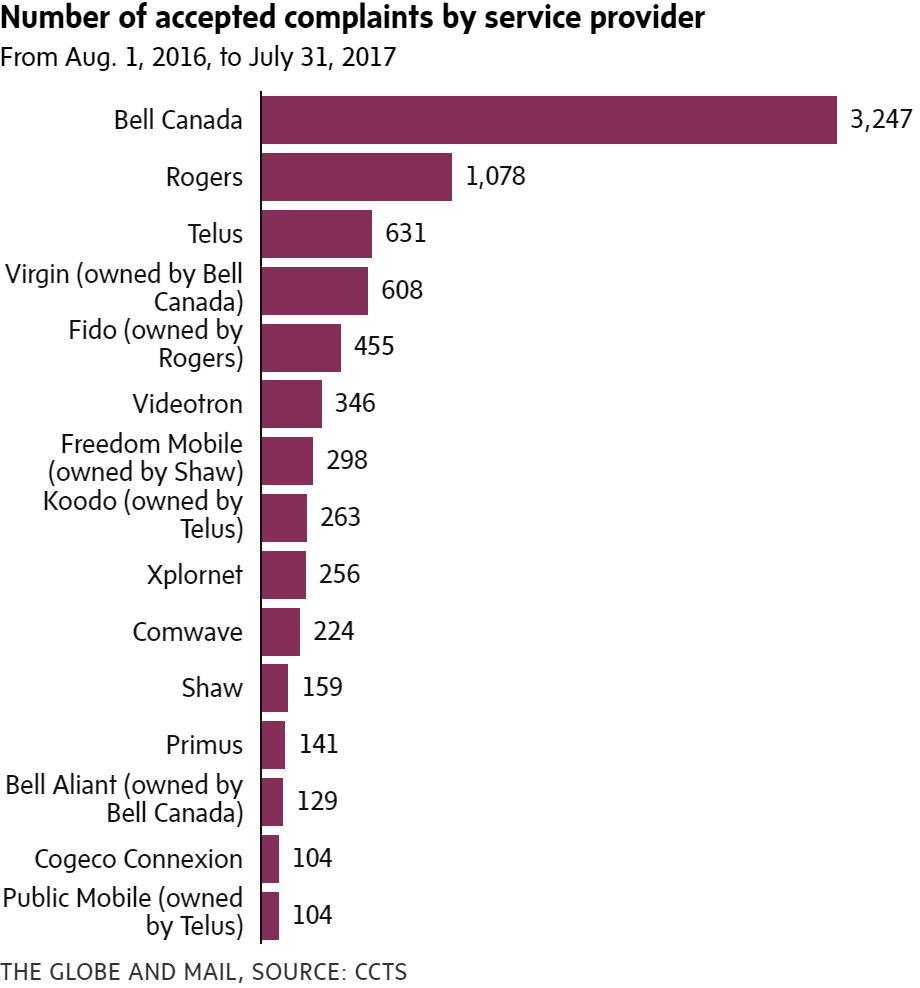A consumer-advocacy group is calling for a code of conduct to govern how telecom companies sell access to the web as a new report shows more Canadians are complaining about their internet service.
The federal Commissioner for Complaints for Telecom-television Services (CCTS) published its annual report on Tuesday, revealing that for the 12-month period ended July 31, customers raised concerns about internet service 5,800 times, up 38 per cent from its 2015-16 report.
Wireless service continues to dominate the complaints the CCTS handles, but, proportionally, it accounts for fewer overall gripes than in the past. Meanwhile, internet complaints have steadily climbed, CCTS commissioner Howard Maker said.
“It’s a concern that, for seven years, the proportion of our work that’s related to internet is increasing,” he said in an interview. He noted that many complaints this year stemmed from BCE Inc.-owned Bell Canada’s move to increase prices on internet and home-phone services in February, a decision that attracted media attention along with heightened customer concerns.
Forty-seven per cent of all complaints about internet in the report were raised by Bell customers, although Mr. Maker added that through working with Bell, “we were able to resolve the vast majority” of those issues.
John Lawford, executive director of the Public Interest Advocacy Centre (PIAC), said the swelling number of complaints warrant broader action, such as a code of conduct around internet services, similar to the wireless code of conduct the Canadian Radio-television and Telecommunications Commission (CRTC) introduced in 2013.
The wireless code – which the CRTC recently reviewed and updated, with changes such as a ban on fees to “unlock” smartphones set to take effect on Friday – aims to ensure consumers have clear, easy-to-understand information about wireless service and also to protect subscribers from unexpected charges for data overages or roaming fees.
Mr. Lawford said similar issues come up in relation to internet service, particularly around unexpected increases in rates or going over monthly data caps.
“It’s not smart to leave internet service, which is just as important as wireless now, without any rules.”
PIAC has also called on the CRTC to initiate an industry-wide inquiry into aggressive sales practices after a CBC report last week in which Bell Canada employees allege they have faced pressure to sell customers services they do not need.
Mr. Lawford said the CCTS annual report continues to show that non-disclosure or misleading information about the terms of service is a major source of complaints, one that he believes relates directly to “misleading sales pitches.”
Customers complained about lack of disclosure or misleading information 2,016 times this year, representing about 11 per cent of overall issues, second only to complaints about incorrect charges.
“I think this shows a very likely grounding for asking for that inquiry on sales practices,” Mr. Lawford said, adding that he does not believe the problem is unique to Bell: “I’m guessing it’s all the big providers.”
CRTC spokeswoman Patricia Valladao said on Monday that PIAC has not filed a formal request for an inquiry and did not comment specifically on whether the regulator itself is considering initiating such a process.
The CCTS’s Mr. Maker said “questionable sales practices” would fall under the misleading/lack of information category, but he also cautioned that it is difficult to draw a direct connection between the CCTS figures and systemic bad practices.
“Was it a legitimate, innocent, miscommunication? Was it a poorly drafted document? Was it an inadequately trained customer-service representative? Or was it an inappropriate sales practice? From our end, they all will probably look much the same,” he said, adding, “Unless we see a big uptick in the volume of these, I don’t think the data either support or disprove the [CBC] story.”
Bell spokesman Marc Choma did not comment specifically on the practices raised in the CBC story or the rise in complaints Bell faced this year over internet service. However, he said on Monday that Bell had the lowest rate of increase in complaints about non-disclosure or misleading information compared with its major competitors. Mr. Choma added: “With the most communications customers by far, Bell does receive the highest overall volume of complaints, but the numbers relative to the industry show we’re making progress.”
The CCTS accepted 9,097 complaints in 2016-17, up about 11 per cent from 8,197 a year earlier. The increase comes after three consecutive years of declines in the number of overall complaints. (Most complaints raise more than one issue.)
Mr. Maker said many factors can lead to a higher number of complaints, including the CCTS’s own efforts to increase public awareness of the role it can play when customers can’t resolve conflicts directly with their providers. “There’s no direct line between the number of complaints we get and how well or how badly service providers are doing on customer service,” he said.
Complaints about the national wireless carriers – Bell, Rogers Communications Inc. and Telus Corp. – all increased this year: The CCTS accepted 3,247 complaints about Bell, which accounted for 36 per cent of overall complaints and was up by 10 per cent from last year. Rogers was second with 1,078, or 12 per cent of complaints, up 25 per cent. Telus was third with 631 or 7 per cent of complaints, an increase of 11 per cent.
All three companies also operate sub-brands for wireless service (Bell owns Virgin Mobile, Rogers owns Fido and Chatr, and Telus owns Koodo and Public Mobile), most of which also placed in the top 10.
Ottawa-based CCTS receives funding from the industry but acts independently of it. It tracks complaints about wireless, internet and home-telephone services and its mandate expanded to include television services in September. (Television complaints will be included in next year’s annual report.)
TELECOM REPORTER
The Globe and Mail, November 28, 2017


